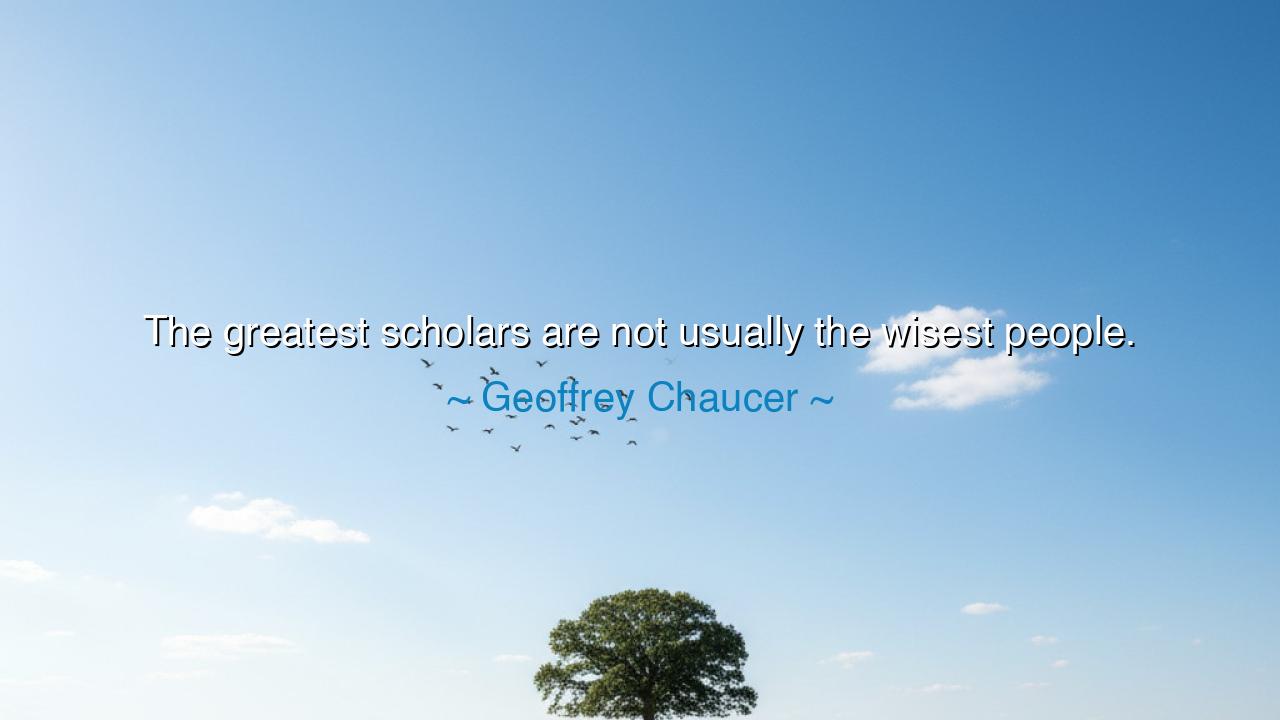
The greatest scholars are not usually the wisest people.






When the poet Geoffrey Chaucer declared, “The greatest scholars are not usually the wisest people,” he spoke not in scorn of learning, but in defense of true wisdom. He had walked among the courts of kings and the cloisters of scholars; he had seen knowledge fill men’s minds, but not always their hearts. His words remind us that wisdom is not measured in books or titles, but in the way one lives and understands the rhythm of existence. Scholarship gathers facts, but wisdom discerns meaning. The mind may store countless truths, but the soul must know how to use them rightly.
In this quote, Chaucer touches the eternal tension between knowledge and understanding. A scholar may study the stars and yet fail to wonder at the heavens; he may read of virtue and still act without it. Knowledge fills the intellect, but wisdom fills the spirit. The ancients knew this distinction well. The philosopher Socrates, though called the wisest of men, claimed to know nothing. In that humble confession lay the essence of wisdom—to know the limits of one’s own knowing. The scholar may seek mastery, but the wise seek harmony with truth itself.
To be a scholar is to hold the lantern; to be wise is to walk by its light. Many through the ages have held that lantern high, only to stumble because they forgot to look where they were going. The danger of knowledge is pride—the belief that knowing is the same as being. The danger of learning is isolation—the building of walls from words instead of bridges of understanding. The truly wise are those who use knowledge as a servant, not as a master. They see through appearances, not merely around them. They do not store wisdom—they embody it.
Consider the story of Isaac Newton, one of the greatest scholars who ever lived. He discovered the laws of motion, the secrets of light, the force that binds the planets—but in his later years, he confessed that he felt like a child playing on the seashore, while the vast ocean of truth lay undiscovered before him. Here lies the paradox of true greatness: the more a person learns, the more they realize how little they know. Wisdom begins where arrogance ends. Newton’s humility, born from the very depths of his genius, was his truest mark of wisdom.
Chaucer’s insight also reflects the soul of his own age—a time when knowledge was guarded by monasteries and nobles, but wisdom often lived among the simple folk: the plowman, the shepherd, the mother who taught her children compassion and faith. For wisdom is not a matter of the mind alone, but of the heart. The unlearned may act with more discernment than the learned if they have cultivated humility, kindness, and an awareness of life’s deeper order. A poor farmer who knows gratitude may understand more of the world’s harmony than a scholar who debates the nature of heaven but never feels its light upon his face.
The meaning, then, is not to despise knowledge, but to honor humility. Let the mind drink deeply from the wells of learning, but let the soul remember that wisdom flows from experience, compassion, and reflection. A person becomes truly wise not through accumulation, but through transformation—by allowing what they know to shape how they live. The greatest fool is often the one who believes himself too intelligent to listen. The greatest sage is the one who, though surrounded by books, still bows before mystery.
The lesson is this: do not confuse cleverness with wisdom, nor intellect with insight. Read, study, learn—but then pause. Walk beneath the open sky. Listen to the silence between thoughts. Speak less and observe more. Let your knowledge breathe until it becomes understanding, and let your understanding ripen until it becomes wisdom.
So, my child, be both a seeker of knowledge and a lover of truth. Learn from the wise and from the humble alike. Remember that the greatest scholars may know the structure of the world, but the wisest people know how to live in it. To know is good—but to understand, to forgive, to love—these are the marks of the truly wise. Let your learning serve your humanity, and you shall walk the path that both enlightens the mind and ennobles the heart.






AAdministratorAdministrator
Welcome, honored guests. Please leave a comment, we will respond soon